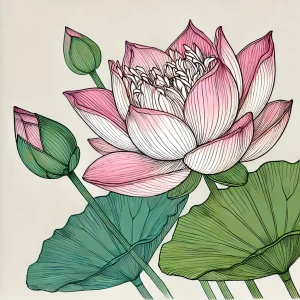紅蓮華 [Gurenge]
LiSA [Lisa]
Words : LiSA [Lisa]
Music : 草野華余子 [KUSANO Kayoko]
“Gurenge” is the opening theme song for the TV anime “鬼滅の刃 / Demon Slayer: Kimetsu no Yaiba wiki“.
“Kimetsu no Yaiba” is a Japanese manga set in the Taisho era, depicting a young boy’s battles against demons to turn his demonized sister back into a human.
Let me briefly explain the “大正 / Taisho” era. Since the end of the samurai era in 1868, Japanese periods are named according to the reigns of emperors. Starting from the 明治 / Meiji era in 1868, followed by 大正 / Taisho, 昭和 / Showa, 平成 / Heisei, and now 令和 / Reiwa from 2019. The Taisho era, lasting only 15 years from 1912 to 1926, was a short period. It was a time when Japan participated in World War I on the side of the Allies, and modernization advanced further. Culturally, it was an era when popular culture flourished, and it was known as the glamorous period of “Taisho Modern.”
Though “Kimetsu no Yaiba” might not strictly adhere to historical accuracy, the anime depicts a blend of retro Western and traditional Japanese architectural styles, and also combines Western and traditional Japanese clothing, embodying the “和洋折衷 / wayōsecchū” (=Japanese-Western eclectic style) aesthetics of the era. While most historical dramas are set before the Meiji era, when Western culture began to significantly influence Japan, this retro era, which mixes Western and Japanese elements, feels niche and exotically charming even to modern Japanese people.

The term “紅蓮華 / gurenge” has a cool vibe that young boys might find appealing, meaning “crimson lotus.” The lotus, native to India, is considered sacred in Hinduism and Buddhism and also refers to a type of Buddhist hell called “Crimson Lotus Hell,” an uncommon term.

強くなれる理由を知った 僕を連れて進め
tsuyoku nareru riyū o shitta boku o tsurete susume
- 強い(つよい) [tsuyoi] : strong
- 理由(りゆう) [riyū] : reason
- 知る(しる) [shiru] : know
- 僕(ぼく) [boku] : I
- 連れる(つれる) [tsureru] : take
- 進む(すすむ) [susumu] : advance
(translation) “I found the reason to become strong. Take me with you and move forward.”
The E minor chord at the “susume” part is cool.
“Boku” is a first-person pronoun used by males, fitting for a theme song of a manga with a boy protagonist.
泥だらけの走馬灯に酔う こわばる心
doro darake no sōmatō ni you kowabaru kokoro
震える手は掴みたいものがある それだけさ
furueru te wa tsukamitai mono ga aru sore dake sa
夜の匂いに空睨んでも
yoru no nioi ni sora nirande mo
変わっていけるのは自分自身だけ それだけさ
kawatte ikeru no wa jibun jishin dake sore dake sa
- 泥(どろ) [doro] : mud
- だらけ [darake] : covered
- 走馬灯(そうまとう) [sōmatō] : revolving lantern
- 心(こころ) [kokoro] : heart
- 震える(ふるえる) [furueru] : tremble
- 手(て) [te] : hand
- 掴む(つかむ) [tsukamu] : grab
- それ [sore] : that
- だけ [dake] : only
- 夜(よる) [yoru] : night
- 匂い(におい) [nioi] : smell
- 空(そら) [sora] : sky
- 変わる(かわる) [kawaru] : change
- 自分自身(じぶんじしん) [jibun jishin] : oneself
(translation) “Getting drunk on muddy revolving lanterns, my heart stiffens.
My trembling hand has something it wants to grab, that’s all.
Even if I glare at the night sky,
the only thing that can change is myself, that’s all.”
“Sōmatō” refers to a revolving lantern originating from China. It is often used to describe a life review, where scenes from one’s life flash by at the moment of death, like a revolving lantern. Though I am not sure if it is used in the sense of a life review here, it does not seem to be used in the literal sense of a revolving lantern.
強くなれる理由を知った 僕を連れて進め
tsuyoku nareru riyū o shitta boku o tsurete susume
どうしたって!
dōshitatte
消せない夢も 止まれない今も
kesenai yume mo tomarenai ima mo
誰かのために強くなれるなら
dareka no tame ni tsuyoku nareru nara
ありがとう 悲しみよ
arigatō kanashimi yo
- 消す(けす) [kesu] : erase
- 夢(ゆめ) [yume] : dream
- 止まる(とまる) [tomaru] : stop
- 今(いま) [ima] : now
- 誰か(だれか) [dareka] : someone
- ため [tame] : for
- ありがとう [arigatō] : thank you
- 悲しみ(かなしみ) [kanashimi] : sorrow
(translation) “I found the reason to become strong. Take me with you and move forward.
No matter what I do
Dreams that cannot be erased, present that cannot be stopped.
if I can become strong for someone,
thank you, sorrow.”
“どうしたって / dōshitatte” can be expressed as “どうやっても / dōyattemo”(=No matter what I do) .
The lyrics “Thank you, sorrow” are quite good.
世界に打ちのめされて負ける意味を知った
sekai ni uchinomesarete makeru imi o shitta
紅蓮の華よ咲き誇れ! 運命を照らして
guren no hana yo sakihokore unmei o terashite
- 世界(せかい) [sekai] : world
- 打ちのめされる(うちのめされる) [uchinomesareru] : be overwhelmed
- 負ける(まける) [makeru] : lose
- 意味(いみ) [imi] : meaning
- 知る(しる) [shiru] : know
- 咲く(さく) [saku] : bloom
- 運命(うんめい) [unmei] : destiny
(translation) “I learned the meaning of losing by being overwhelmed by the world.
Crimson lotus, bloom in full glory! Illuminate my destiny.”
イナビカリの雑音が耳を刺す 戸惑う心
inabikari no zatsuon ga mimi o sasu tomadou kokoro
優しいだけじゃ守れないものがある? わかってるけど
yasashii dake ja mamorenai mono ga aru wakatteru kedo
水面下で絡まる善悪 透けて見える偽善に天罰
suimenka de karamaru zen’aku sukete mieru gizen ni tenbatsu
逸材の花より 挑み続け咲いた一輪が美しい
itsuzai no hana yori idomi tsuzuke saita ichirin ga utsukushii
- 稲光(いなびかり) [inabikari] : lightning
- 雑音(ざつおん) [zatsuon] : noise
- 耳(みみ) [mimi] : ear
- 戸惑う(とまどう) [tomadou] : be bewildered
- 心(こころ) [kokoro] : heart
- 優しい(やさしい) [yasashii] : gentle
- 守る(まもる) [mamoru] : protect
- わかってる [wakatte iru] : understand
- 水面下(すいめんか) [suimenka] : underwater
- 善悪(ぜんあく) [zen’aku] : good and evil
- 透ける(すける) [sukeru] : transparent
- 天罰(てんばつ) [tenbatsu] : divine punishment
- 花(はな) [hana] : flower
- 挑む(いどむ) [idomu] : challenge
- 続ける(つづける) [tsuzukeru] : continue
- 一輪(いちりん) [ichirin] : one flower
- 美しい(うつくしい) [utsukushii] : beautiful
(translation) “The lightning noise pierces my ears, bewildering my heart.
There are things that can’t be protected by kindness alone? I understand that.
Good and evil intertwine underwater, divine punishment for the visible hypocrisy.
More beautiful than a flower of talent is the single bloom that continues to challenge.”
The last line suggests that something gained through effort is more precious and beautiful than something inherently talented.
乱暴に敷き詰められた トゲだらけの道も
ranbō ni shikitsumerareta toge darake no michi mo
本気の僕だけに現れるから 乗り越えてみせるよ
honki no boku dake ni arareru kara norikoete miseru yo
簡単に片付けられた 守れなかった夢も
kantan ni katadukerareta mamorenakatta yume mo
紅蓮の心臓に根を生やし この血に宿ってる
guren no shinzō ni ne o hayashi kono chi ni yadotteru
- 乱暴(らんぼう) [ranbō] : rough
- 敷き 詰める(しきつめる) [shikitsumeru] : spread
- とげ [toge] : thorn
- 道(みち) [michi] : road
- 本気(ほんき) [honki] : earnest
- 現れる(あらわれる) [arareru] : appear
- 乗り越える(のりこえる) [norikoeru] : overcome
- 簡単な(かんたんな) [kantan na] : simple
- 片付ける(かたづける) [katadukeru] : tidy up
- 守る(まもる) [mamoru] : protect
- 心臓(しんぞう) [shinzō] : heart
- 根(ね) [ne] : root
- 生やす(はやす) [hayasu] : grow
- 血(ち) [chi] : blood
(translation) “Even the thorny road roughly spread out,
because it appears only to my earnest self, I’ll overcome it.
Even the dreams I couldn’t protect and were easily tidied up,
they grow roots in my crimson heart and reside in this blood.”
人知れず儚い 散りゆく結末
hitoshirezu hakanai chiri yuku ketsumatsu
無情に破れた 悲鳴の風吹く
mujō ni yabureta himei no kaze fuku
誰かの笑う影 誰かの泣き声
dareka no warau kage dareka no nakigoe
誰もが幸せを願ってる
daremo ga shiawase o negatteru
- 儚い(はかない) [hakanai] : fleeting
- 散る(ちる) [chiru] : scatter
- 結末(けつまつ) [ketsumatsu] : conclusion
- 破れる(やぶれる) [yabureru] : tear
- 悲鳴(ひめい) [himei] : scream
- 風(かぜ) [kaze] : wind
- 吹く(ふく) [fuku] : blow
- 誰か(だれか) [dareka] : someone
- 笑う(わらう) [warau] : laugh
- 影(かげ) [kage] : shadow
- 泣き声(なきごえ) [nakigoe] : crying voice
- 幸せ(しあわせ) [shiawase] : happiness
- 願う(ねがう) [negau] : wish
(translation) “A fleeting, secret conclusion scattering away,
the wind of broken screams blows.
Someone’s laughing shadow, someone’s crying voice,
everyone is wishing for happiness.”
どうしたって!
dōshitatte
消せない夢も 止まれない今も
kesenai yume mo tomarenai ima mo
誰かのために強くなれるなら
dareka no tame ni tsuyoku nareru nara
ありがとう 悲しみよ
arigatō kanashimi yo
世界に打ちのめされて負ける意味を知った
sekai ni uchinomesarete makeru imi o shitta
紅蓮の華よ咲き誇れ! 運命を照らして
guren no hana yo sakihokore unmei o terashite
Due to the immense popularity of “Kimetsu no Yaiba,” “Gurenge” has become Lisa’s biggest hit to date.
At the closing ceremony of the 2021 Tokyo Olympics, The band “Tokyo Ska Paradise Orchestra” and high school students performed “Gurenge,” which also garnered much attention.
Thanks for reading! Feel free to comment if you have any feedback or questions.
Follow me on X.



